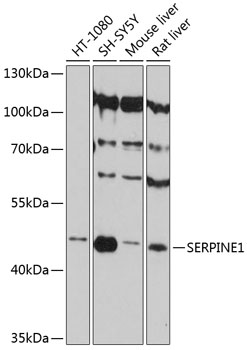Cell Biology Antibodies 2
Anti-SERPINE1 Antibody (CAB12102)
- SKU:
- CAB12102
- Product Type:
- Antibody
- Reactivity:
- Human
- Reactivity:
- Mouse
- Reactivity:
- Rat
- Host Species:
- Rabbit
- Isotype:
- IgG
- Antibody Type:
- Polyclonal Antibody
- Research Area:
- Cell Biology
Description
| Antibody Name: | Anti-SERPINE1 Antibody |
| Antibody SKU: | CAB12102 |
| Antibody Size: | 20uL, 50uL, 100uL |
| Application: | WB IF |
| Reactivity: | Human, Mouse, Rat |
| Host Species: | Rabbit |
| Immunogen: | Recombinant fusion protein containing a sequence corresponding to amino acids 24-158 of human SERPINE1 (NP_000593.1). |
| Application: | WB IF |
| Recommended Dilution: | WB 1:500 - 1:2000 IF 1:50 - 1:100 |
| Reactivity: | Human, Mouse, Rat |
| Positive Samples: | HT-1080, SH-SY5Y, Mouse liver, Rat liver |
| Immunogen: | Recombinant fusion protein containing a sequence corresponding to amino acids 24-158 of human SERPINE1 (NP_000593.1). |
| Purification Method: | Affinity purification |
| Storage Buffer: | Store at -20'C. Avoid freeze / thaw cycles. Buffer: PBS with 0.02% sodium azide, 50% glycerol, pH7.3. |
| Isotype: | IgG |
| Sequence: | VHHP PSYV AHLA SDFG VRVF QQVA QASK DRNV VFSP YGVA SVLA MLQL TTGG ETQQ QIQA AMGF KIDD KGMA PALR HLYK ELMG PWNK DEIS TTDA IFVQ RDLK LVQG FMPH FFRL FRST VKQV DFSE VERA RFI |
| Gene ID: | 5054 |
| Uniprot: | P05121 |
| Cellular Location: | Secreted |
| Calculated MW: | 43kDa/45kDa |
| Observed MW: | 45kDa |
| Synonyms: | PAI, PAI-1, PAI1, PLANH1, SERPINE1 |
| Background: | This gene encodes a member of the serine proteinase inhibitor (serpin) superfamily. This member is the principal inhibitor of tissue plasminogen activator (tPA) and urokinase (uPA), and hence is an inhibitor of fibrinolysis. Defects in this gene are the cause of plasminogen activator inhibitor-1 deficiency (PAI-1 deficiency), and high concentrations of the gene product are associated with thrombophilia. Alternatively spliced transcript variants encoding different isoforms have been found for this gene. |
| UniProt Protein Function: | SERPINE1: a secreted protein that acts as 'bait' for tissue plasminogen activator, urokinase, and protein C. Its rapid interaction with TPA may function as a major control point in the regulation of fibrinolysis. Belongs to the serpin family. Interacts with VTN. Binds LRP1B; binding is followed by internalization and degradation. Plasma levels of PAI-1 and VCAM-1 together may be useful in predicting post-operative recurrence in patients with colorectal cancer. |
| UniProt Protein Details: | Protein type:Secreted, signal peptide; Motility/polarity/chemotaxis; Secreted Chromosomal Location of Human Ortholog: 7q22.1 Cellular Component: extracellular matrix; extracellular space; extracellular region; plasma membrane Molecular Function:serine-type endopeptidase inhibitor activity; protein binding; protease binding; receptor binding Biological Process: circadian rhythm; transcription initiation from RNA polymerase II promoter; platelet activation; extracellular matrix organization and biogenesis; positive regulation of blood coagulation; transcription, DNA-dependent; negative regulation of blood coagulation; negative regulation of smooth muscle cell migration; defense response to Gram-negative bacterium; positive regulation of receptor-mediated endocytosis; regulation of cell proliferation; positive regulation of interleukin-8 production; fibrinolysis; positive regulation of angiogenesis; platelet degranulation; negative regulation of fibrinolysis; transforming growth factor beta receptor signaling pathway; gene expression; positive regulation of transcription from RNA polymerase II promoter; regulation of receptor activity; angiogenesis; chronological cell aging; blood coagulation; negative regulation of cell adhesion mediated by integrin; negative regulation of cell migration; positive regulation of inflammatory response Disease: Plasminogen Activator Inhibitor-1 Deficiency |
| NCBI Summary: | This gene encodes a member of the serine proteinase inhibitor (serpin) superfamily. This member is the principal inhibitor of tissue plasminogen activator (tPA) and urokinase (uPA), and hence is an inhibitor of fibrinolysis. Defects in this gene are the cause of plasminogen activator inhibitor-1 deficiency (PAI-1 deficiency), and high concentrations of the gene product are associated with thrombophilia. Alternatively spliced transcript variants encoding different isoforms have been found for this gene. [provided by RefSeq, Sep 2009] |
| UniProt Code: | P05121 |
| NCBI GenInfo Identifier: | 129576 |
| NCBI Gene ID: | 5054 |
| NCBI Accession: | P05121.1 |
| UniProt Secondary Accession: | P05121,B7Z4S0, F8WD53, |
| UniProt Related Accession: | P05121 |
| Molecular Weight: | 43,404 Da |
| NCBI Full Name: | Plasminogen activator inhibitor 1 |
| NCBI Synonym Full Names: | serpin peptidase inhibitor, clade E (nexin, plasminogen activator inhibitor type 1), member 1 |
| NCBI Official Symbol: | SERPINE1 |
| NCBI Official Synonym Symbols: | PAI; PAI1; PAI-1; PLANH1 |
| NCBI Protein Information: | plasminogen activator inhibitor 1; serpin E1; endothelial plasminogen activator inhibitor; serine (or cysteine) proteinase inhibitor, clade E (nexin, plasminogen activator inhibitor type 1), member 1 |
| UniProt Protein Name: | Plasminogen activator inhibitor 1 |
| UniProt Synonym Protein Names: | Endothelial plasminogen activator inhibitor; Serpin E1 |
| UniProt Gene Name: | SERPINE1 |
| UniProt Entry Name: | PAI1_HUMAN |





![SERPINE1 Monoclonal Antibody [PAT1C5AT] (CPAB0255) SERPINE1 Monoclonal Antibody [PAT1C5AT] (CPAB0255)](https://cdn11.bigcommerce.com/s-rd6ounxcu2/images/stencil/590x590/products/58480/63662/serpine1-monoclonal-antibody-pat1c5at-cpab0255__08360__48318.1706535026.jpg?c=1)

